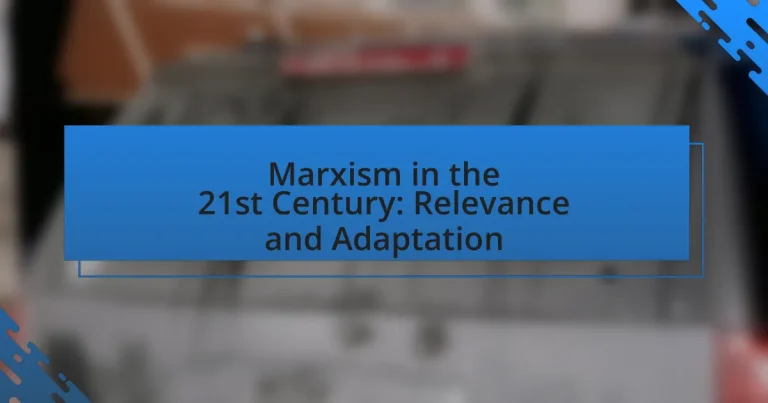Marxism in the 21st Century is a theoretical framework that critiques capitalism and advocates for social change through collective ownership and resource redistribution. The article explores the evolution of Marxism since the 20th century, highlighting contemporary interpretations that address economic inequality, globalization, and environmental degradation. Key principles of modern Marxism include a focus on social justice, class struggle, and the intersectionality of various forms of oppression. The relevance of Marxism today is underscored by its application in current social movements and its adaptation to modern contexts, including technology and cultural factors. The article also discusses the challenges and criticisms faced by Marxism, as well as practical insights for individuals and future activism.

What is Marxism in the 21st Century?
Marxism in the 21st Century is a theoretical framework that critiques capitalism and advocates for social change through collective ownership and the redistribution of resources. This contemporary interpretation emphasizes the relevance of Marxist principles in addressing modern issues such as economic inequality, globalization, and environmental degradation. Scholars like David Harvey and Slavoj Žižek have explored how Marxist analysis can be applied to current socio-economic conditions, highlighting the persistence of class struggle and the need for systemic change in response to neoliberal policies.
How has Marxism evolved since the 20th century?
Marxism has evolved significantly since the 20th century, adapting to contemporary socio-economic conditions and integrating new theoretical perspectives. In the late 20th century, the fall of the Soviet Union prompted a reevaluation of Marxist principles, leading to the emergence of various strands such as democratic socialism, eco-socialism, and cultural Marxism, which address issues like environmental sustainability and identity politics. Additionally, the rise of globalization has influenced Marxist thought, with scholars like David Harvey analyzing the impacts of neoliberal capitalism on class struggle and urbanization. This evolution reflects a broader application of Marxist analysis to modern issues, demonstrating its ongoing relevance in critiquing capitalism and advocating for social justice.
What are the key principles of contemporary Marxism?
The key principles of contemporary Marxism include the critique of capitalism, the emphasis on social justice, and the focus on class struggle. Contemporary Marxists analyze how capitalism perpetuates inequality and exploitation, arguing that economic systems must be transformed to achieve equitable distribution of resources. They advocate for social justice by addressing issues such as race, gender, and environmental concerns, recognizing that these intersect with class dynamics. Additionally, contemporary Marxism stresses the importance of collective action and solidarity among the working class to challenge oppressive structures and promote systemic change. These principles are supported by various scholars and movements that highlight the ongoing relevance of Marxist theory in addressing modern societal issues.
How do modern interpretations differ from classical Marxism?
Modern interpretations of Marxism differ from classical Marxism primarily in their emphasis on cultural and identity issues alongside economic factors. While classical Marxism focuses predominantly on class struggle and the economic base as the primary driver of societal change, contemporary interpretations incorporate elements such as race, gender, and environmental concerns, reflecting a broader understanding of oppression and inequality. For instance, scholars like Nancy Fraser and David Harvey argue that social movements today must address multiple axes of identity and power, rather than solely focusing on class. This shift acknowledges the complexities of modern society and the interconnectedness of various forms of oppression, which classical Marxism did not fully account for.
Why is Marxism still relevant today?
Marxism remains relevant today due to its critical analysis of capitalism and its focus on social inequality. The increasing wealth gap, with the top 1% owning more than half of the world’s wealth, highlights the systemic issues that Marxism critiques. Additionally, contemporary movements advocating for workers’ rights and social justice reflect Marxist principles, demonstrating its ongoing influence in addressing economic disparities and advocating for collective action. The resurgence of interest in Marxist theory in academic and activist circles further underscores its applicability to modern socio-economic challenges.
What social and economic issues does Marxism address in the 21st century?
Marxism addresses issues of income inequality, labor exploitation, and the concentration of wealth in the 21st century. These issues manifest through the widening gap between the rich and the poor, with data from the World Inequality Report 2022 indicating that the top 10% of earners capture a significant portion of global income. Additionally, Marxism critiques the gig economy and precarious work conditions, highlighting how many workers face unstable employment and lack of benefits, which undermines their economic security. The ongoing struggles for workers’ rights and social justice movements reflect Marxist principles, as they seek to challenge capitalist structures that perpetuate these inequalities.
How do contemporary movements reflect Marxist ideas?
Contemporary movements reflect Marxist ideas through their emphasis on class struggle, economic inequality, and collective action. For instance, movements such as Black Lives Matter and the Fight for $15 advocate for social justice and economic equity, aligning with Marxist critiques of capitalism that highlight the exploitation of marginalized groups. These movements often mobilize grassroots organizing and solidarity, echoing Marxist principles of collective empowerment against oppressive systems. Additionally, the rise of anti-capitalist sentiments in protests against austerity measures and corporate influence in politics demonstrates a growing awareness of class dynamics, reminiscent of Marxist analysis. The global Occupy Wall Street movement explicitly targeted wealth inequality, mirroring Marxist critiques of capitalist structures that prioritize profit over people.

How is Marxism adapted to modern contexts?
Marxism is adapted to modern contexts through the incorporation of contemporary social issues such as globalization, environmental concerns, and digital capitalism. Modern Marxist theorists analyze how capitalism has evolved, focusing on the impact of multinational corporations and the gig economy on labor relations. For instance, David Harvey’s work on spatial capitalism highlights how urbanization and economic inequality are influenced by capitalist practices today. Additionally, eco-socialism merges Marxist principles with environmentalism, addressing climate change as a product of capitalist exploitation. This adaptation demonstrates Marxism’s ongoing relevance in critiquing and understanding current socio-economic structures.
What are the new applications of Marxist theory?
New applications of Marxist theory include its integration into contemporary social movements, such as environmentalism and anti-globalization efforts. These movements utilize Marxist concepts to critique capitalism’s role in ecological degradation and economic inequality. For instance, eco-Marxism examines the relationship between capitalism and environmental exploitation, arguing that capitalist production methods are unsustainable. Additionally, Marxist analysis is applied in the study of digital labor and the gig economy, highlighting how these new forms of work perpetuate class struggles and exploitation. This adaptation of Marxist theory demonstrates its ongoing relevance in analyzing and addressing modern socio-economic issues.
How is Marxism applied in current political movements?
Marxism is applied in current political movements primarily through the advocacy for social justice, economic equality, and anti-capitalist sentiments. Various leftist parties and organizations, such as the Democratic Socialists of America and Podemos in Spain, incorporate Marxist principles to challenge neoliberal policies and promote wealth redistribution. For instance, the rise of movements like Black Lives Matter and climate justice initiatives often reflect Marxist critiques of capitalism’s role in perpetuating systemic inequalities and environmental degradation. These movements utilize Marxist analysis to frame their struggles against oppression and exploitation, demonstrating the ongoing relevance of Marxist thought in contemporary political discourse.
What role does technology play in the adaptation of Marxism?
Technology plays a crucial role in the adaptation of Marxism by reshaping the means of production and altering class dynamics. The rise of digital platforms and automation has transformed labor relations, leading to new forms of exploitation and class struggle that align with Marxist analysis. For instance, the gig economy exemplifies how technology enables capital to extract surplus value from workers without traditional employment structures, reflecting Marx’s theories on labor and capital. Additionally, advancements in communication technology facilitate the dissemination of Marxist ideas, allowing for global solidarity among workers and the organization of movements that challenge capitalist structures. This adaptation demonstrates the relevance of Marxism in analyzing contemporary economic and social issues influenced by technological change.
How do different regions interpret Marxism today?
Different regions interpret Marxism today through various lenses shaped by local socio-economic conditions and historical contexts. In Latin America, for instance, Marxism has been adapted to address issues of inequality and indigenous rights, leading to movements like the Bolivian MAS party, which emphasizes social justice and anti-imperialism. In contrast, in Western Europe, Marxism is often viewed through a democratic socialist framework, focusing on reforming capitalism rather than overthrowing it, as seen in parties like the UK’s Labour Party. Meanwhile, in China, Marxism has been integrated with market-oriented reforms, resulting in a unique model that prioritizes economic growth while maintaining a one-party state. These interpretations reflect the diverse applications of Marxist theory in response to regional challenges, demonstrating its adaptability and ongoing relevance in the 21st century.
What are the variations of Marxism in developed versus developing countries?
Variations of Marxism in developed versus developing countries primarily manifest in their adaptation to local socio-economic contexts. In developed countries, Marxism often emphasizes issues like social democracy, labor rights, and critiques of neoliberal capitalism, as seen in movements such as democratic socialism in Scandinavia. In contrast, developing countries frequently adopt a more revolutionary approach, focusing on anti-imperialism and agrarian reform, as evidenced by Marxist movements in Latin America and parts of Africa, where historical colonialism and economic exploitation shape their struggles. These adaptations reflect the differing historical and economic realities faced by societies, with developed nations addressing systemic inequalities within established frameworks, while developing nations often seek radical change to address foundational issues of poverty and exploitation.
How do cultural contexts influence Marxist thought?
Cultural contexts significantly influence Marxist thought by shaping its interpretation and application in various societies. For instance, Marxism adapts to local conditions, such as economic structures, social hierarchies, and historical experiences, which can lead to diverse manifestations like Latin American Marxism or Afro-Marxism. These adaptations reflect the specific struggles and aspirations of different cultures, demonstrating that Marxist theory is not monolithic but rather evolves in response to the unique challenges faced by communities. Historical examples include the Cuban Revolution, where Marxist principles were integrated with local nationalist sentiments, illustrating how cultural factors can redefine Marxist ideology to resonate with specific populations.

What challenges does Marxism face in the 21st century?
Marxism faces significant challenges in the 21st century, primarily due to globalization, technological advancements, and the rise of neoliberal economic policies. Globalization has led to increased economic interdependence, which complicates the Marxist critique of capitalism by creating a more complex global class structure. Technological advancements, particularly in automation and artificial intelligence, have transformed labor markets, leading to job displacement and changing the nature of work, which Marxism must address to remain relevant. Additionally, the dominance of neoliberal policies has shifted political and economic power away from traditional Marxist ideals, making it difficult for Marxist movements to gain traction in many regions. These factors collectively challenge the applicability and adaptation of Marxist theory in contemporary society.
What criticisms are directed at contemporary Marxism?
Contemporary Marxism faces several criticisms, primarily centered around its perceived irrelevance in modern capitalist societies, its deterministic view of history, and its failure to address issues of identity and culture. Critics argue that Marxism’s focus on class struggle overlooks the complexities of contemporary social dynamics, including race, gender, and environmental concerns. Additionally, the historical failures of Marxist regimes, such as in the Soviet Union and China, are cited as evidence of its practical shortcomings. Scholars like Francis Fukuyama have argued that the end of the Cold War marked the triumph of liberal democracy over Marxist ideology, suggesting that Marxism lacks a viable framework for addressing current global challenges.
How do economic realities challenge Marxist principles?
Economic realities challenge Marxist principles by demonstrating the complexities of modern capitalism, which often diverges from the binary class struggle that Marx envisioned. For instance, the rise of the gig economy and technological advancements have created new forms of labor and capital that do not fit neatly into Marx’s framework of proletariat versus bourgeoisie. Additionally, empirical evidence shows that many capitalist societies have successfully implemented social safety nets and welfare programs, which mitigate class conflict and inequality, contradicting Marx’s prediction of inevitable class warfare. Furthermore, the global economy’s interconnectedness has led to a diversification of class structures, complicating the simplistic dichotomy of Marxist theory.
What are the responses to critiques of Marxism today?
Responses to critiques of Marxism today include the adaptation of Marxist theory to contemporary issues such as globalization, environmental concerns, and social justice movements. Proponents argue that Marxism remains relevant by addressing the failures of capitalism, particularly in wealth inequality and labor exploitation, as evidenced by rising economic disparities reported by organizations like Oxfam, which noted that the richest 1% hold more wealth than the rest of the global population combined. Additionally, modern Marxists emphasize the importance of intersectionality, integrating feminist and anti-racist perspectives into Marxist analysis to respond to critiques that traditional Marxism overlooks these dimensions. This evolution demonstrates that Marxism can adapt to current socio-economic challenges while maintaining its core critique of capitalist structures.
How does Marxism interact with other ideologies?
Marxism interacts with other ideologies primarily through its critique of capitalism and its emphasis on class struggle, which influences various political movements and theories. For instance, Marxism has significantly shaped socialist and communist ideologies, advocating for collective ownership and the redistribution of wealth. Additionally, it has engaged with liberalism by challenging the notion of individualism and highlighting the socio-economic structures that limit true freedom. Historical examples include the influence of Marxist thought on the Russian Revolution, which led to the establishment of a communist state, and its impact on anti-colonial movements in the 20th century, where leaders like Ho Chi Minh integrated Marxist principles into their struggle for independence. Furthermore, contemporary discussions around intersectionality in social justice movements often draw from Marxist analysis to address how class intersects with race, gender, and other identities, demonstrating its ongoing relevance in modern ideological debates.
What are the relationships between Marxism and capitalism in modern discourse?
Marxism and capitalism are often discussed in modern discourse as opposing economic and social systems, with Marxism critiquing capitalism’s inherent inequalities and advocating for a classless society. In contemporary discussions, Marxist theory is frequently invoked to analyze the consequences of capitalism, such as wealth disparity, labor exploitation, and environmental degradation. For instance, the rise of gig economies and precarious work conditions has led to renewed interest in Marxist critiques of labor relations, highlighting how capitalism can undermine workers’ rights and benefits. Additionally, the global financial crises have prompted scholars and activists to revisit Marxist concepts, arguing that capitalism’s cyclical crises validate Marx’s predictions about its unsustainability. This relationship is further evidenced by the resurgence of socialist movements in various countries, which draw on Marxist principles to challenge capitalist structures and advocate for systemic change.
How does Marxism engage with environmentalism and feminism?
Marxism engages with environmentalism and feminism by analyzing the interconnectedness of capitalism, ecological degradation, and gender inequality. Marxist theory posits that capitalism exploits both natural resources and marginalized groups, including women, leading to environmental destruction and social oppression. For instance, ecofeminism, which combines ecological concerns with feminist perspectives, highlights how patriarchal structures contribute to environmental harm, arguing that the exploitation of nature parallels the exploitation of women. This intersectional approach is supported by historical evidence, such as the role of women in grassroots environmental movements, which often challenge capitalist practices that harm both the environment and women’s rights. Thus, Marxism provides a critical framework for understanding and addressing the systemic roots of both environmental and feminist issues in contemporary society.
What practical insights can be drawn from Marxism in the 21st century?
Practical insights drawn from Marxism in the 21st century include the critique of capitalism’s inequalities and the emphasis on collective action for social change. Marxism highlights the growing wealth gap, as evidenced by reports indicating that the richest 1% hold more wealth than the rest of the global population combined. This insight encourages movements advocating for economic justice and workers’ rights, such as the push for a living wage and universal healthcare. Additionally, Marxist analysis of labor exploitation remains relevant, as gig economy workers often face precarious conditions without traditional labor protections. These insights inform contemporary social movements and policy discussions aimed at addressing systemic inequalities.
How can individuals apply Marxist principles in their daily lives?
Individuals can apply Marxist principles in their daily lives by promoting collective ownership and cooperation over individualism and competition. This can be achieved through participating in cooperative businesses, supporting local economies, and engaging in community organizing efforts that prioritize the needs of the collective over profit motives. For instance, the rise of worker cooperatives, which are owned and managed by employees, exemplifies the practical application of Marxist ideas about labor and ownership. Additionally, individuals can advocate for policies that reduce income inequality, such as progressive taxation and universal healthcare, reflecting Marxist critiques of capitalism. These actions demonstrate a commitment to social justice and economic equity, aligning with Marxist principles in a contemporary context.
What lessons can be learned from Marxist movements for future activism?
Marxist movements teach that collective action and solidarity are essential for effective activism. Historical examples, such as the labor movements of the early 20th century, demonstrate that organizing workers around common interests can lead to significant social and economic reforms. Additionally, the emphasis on analyzing power structures and class dynamics, as seen in the writings of Marx, provides a framework for understanding contemporary inequalities. This analytical approach can guide future activists in identifying and addressing systemic issues, ensuring that movements remain focused on the root causes of oppression rather than merely addressing symptoms.





